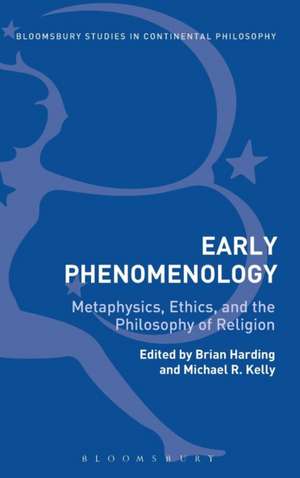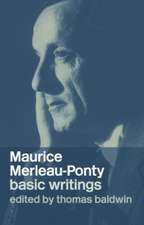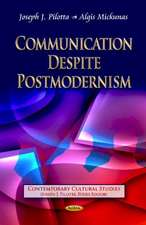Early Phenomenology: Metaphysics, Ethics, and the Philosophy of Religion: Bloomsbury Studies in Continental Philosophy
Editat de Dr Brian Harding, Professor Michael R. Kellyen Limba Engleză Hardback – 29 iun 2016
Din seria Bloomsbury Studies in Continental Philosophy
- 14%
 Preț: 179.26 lei
Preț: 179.26 lei - 23%
 Preț: 179.10 lei
Preț: 179.10 lei - 13%
 Preț: 238.22 lei
Preț: 238.22 lei - 31%
 Preț: 772.98 lei
Preț: 772.98 lei - 30%
 Preț: 773.39 lei
Preț: 773.39 lei - 14%
 Preț: 888.65 lei
Preț: 888.65 lei - 22%
 Preț: 772.98 lei
Preț: 772.98 lei - 13%
 Preț: 258.33 lei
Preț: 258.33 lei - 23%
 Preț: 256.02 lei
Preț: 256.02 lei - 30%
 Preț: 715.00 lei
Preț: 715.00 lei -
 Preț: 255.66 lei
Preț: 255.66 lei - 22%
 Preț: 773.06 lei
Preț: 773.06 lei - 14%
 Preț: 891.10 lei
Preț: 891.10 lei - 30%
 Preț: 774.20 lei
Preț: 774.20 lei - 13%
 Preț: 257.97 lei
Preț: 257.97 lei - 30%
 Preț: 715.00 lei
Preț: 715.00 lei - 22%
 Preț: 774.62 lei
Preț: 774.62 lei - 13%
 Preț: 256.20 lei
Preț: 256.20 lei -
 Preț: 256.59 lei
Preț: 256.59 lei - 22%
 Preț: 257.50 lei
Preț: 257.50 lei - 13%
 Preț: 257.03 lei
Preț: 257.03 lei - 13%
 Preț: 257.68 lei
Preț: 257.68 lei - 13%
 Preț: 258.15 lei
Preț: 258.15 lei - 30%
 Preț: 715.19 lei
Preț: 715.19 lei - 13%
 Preț: 256.49 lei
Preț: 256.49 lei - 22%
 Preț: 891.10 lei
Preț: 891.10 lei -
 Preț: 255.94 lei
Preț: 255.94 lei - 13%
 Preț: 236.45 lei
Preț: 236.45 lei - 30%
 Preț: 714.92 lei
Preț: 714.92 lei - 30%
 Preț: 773.81 lei
Preț: 773.81 lei - 22%
 Preț: 772.98 lei
Preț: 772.98 lei - 22%
 Preț: 889.08 lei
Preț: 889.08 lei - 30%
 Preț: 714.61 lei
Preț: 714.61 lei -
 Preț: 256.59 lei
Preț: 256.59 lei - 14%
 Preț: 772.98 lei
Preț: 772.98 lei - 22%
 Preț: 257.68 lei
Preț: 257.68 lei - 22%
 Preț: 891.75 lei
Preț: 891.75 lei
Preț: 773.81 lei
Preț vechi: 1112.93 lei
-30% Nou
Puncte Express: 1161
Preț estimativ în valută:
148.07€ • 152.76$ • 123.56£
148.07€ • 152.76$ • 123.56£
Carte tipărită la comandă
Livrare economică 26 martie-09 aprilie
Preluare comenzi: 021 569.72.76
Specificații
ISBN-13: 9781474276047
ISBN-10: 1474276040
Pagini: 256
Dimensiuni: 156 x 234 x 23 mm
Greutate: 0.52 kg
Editura: Bloomsbury Publishing
Colecția Bloomsbury Academic
Seria Bloomsbury Studies in Continental Philosophy
Locul publicării:London, United Kingdom
ISBN-10: 1474276040
Pagini: 256
Dimensiuni: 156 x 234 x 23 mm
Greutate: 0.52 kg
Editura: Bloomsbury Publishing
Colecția Bloomsbury Academic
Seria Bloomsbury Studies in Continental Philosophy
Locul publicării:London, United Kingdom
Caracteristici
Combining historical scholarship and philosophical relevance this book discusses important issues in ethics, phenomenology, philosophical methodology, philosophy of religion, and metaphysics
Notă biografică
Brian Harding is Associate Professor of Philosophy at the Texas Woman's University, USA.Michael R. Kelly is Assistant Professor of Philosophy at the University of San Diego, USA. He is the editor of Bergson and Phenomenology (2010).
Cuprins
1. MICHAEL KELLY AND BRIAN HARDING General Introduction A) PHENOMENOLOGICAL OCCASIONS 2. LESTER EMBREE (Florida Atlantic University) Speculations about Bridging the Göttingen-Freiburg Gap in Phenomenology 3. ADOLF REINACH (trans. Kim Baltzer-Jaray) Phenomenology of Foreboding/Foreseeing B) PHENOMENOLOGY OF AFFECT, EMOTION AND VOLITION 4. JOHN CROSBY (Franciscan University of Steubenville) Person and Love: Dietrich von Hildebrand in Dialogue with John Zizioulas 5. MICHAEL KELLY (University of San Diego) Envy and Ressentiment, a Difference in Kind: A Critique and Renewal of Scheler's Phenomenological Account 6. KIM BALTZER-JARAY (University of Western Ontario) Notes from the Battlefield: Reinach's Phenomenology of Foreboding 7. MARTA UBALAI (KU Leuven) Alexander Pfander's Phenomenological Psychology: Philosophy Devoted to Description C) EARLY REACTIONS TO PHENOMENOLOGY 8. BRIAN HARDING (Texas Woman's University) Josè Ortega y Gasset's Reduction to Life 9. KEITH PETERSON (Colby College) Scenes of Disagreement: Nicolai Hartmann between Phenomenological Ontology and Speculative Realism 10. ROBERT WOOD (University of Dallas) Buber Meets Heidegger D) EARLY PHENOMENOLOGY OF RELIGION 11. JONNA BORNEMARK (Södertörn University) Edith Stein and the Carmelites 12. BRIAN GREGOR (California State University - Dominguez Hills): The Transcendence of the Person: Bonhoeffer as a Resource for Phenomenology of Religion and Ethics 13. MEROLD WESTPHAL (Fordham University) Rudolf Otto as Postmodern Phenomenologist: In Dialogue with Marion, Derrida, and Kierkegaard
Recenzii
Though the early years of the phenomenological movement represent a veritable treasure trove of philosophical insight, the thinkers of this period are almost always overlooked by both philosophers and historians alike, in part due to an inability to see past the imposing legacies of Husserl and Heidegger. This volume offers a long overdue introduction to philosophers whose work remains of fundamental relevance to those seeking to understand the potential of phenomenology for philosophy.
The editors should be praised for having the contributors to this volume organize their essays so that they lay out at the beginning how they are going to proceed and that they always end with some concluding remarks about what has been accomplished. This adds a coherence to the intent to provoke further research and conversation beyond what could be accomplished by simply assembling author's responses to a proposed topic.
The editors should be praised for having the contributors to this volume organize their essays so that they lay out at the beginning how they are going to proceed and that they always end with some concluding remarks about what has been accomplished. This adds a coherence to the intent to provoke further research and conversation beyond what could be accomplished by simply assembling author's responses to a proposed topic.















